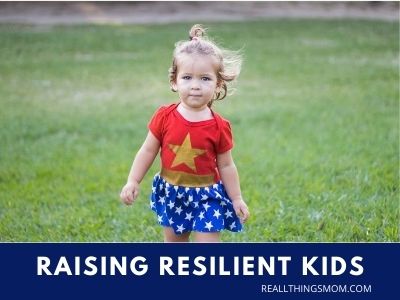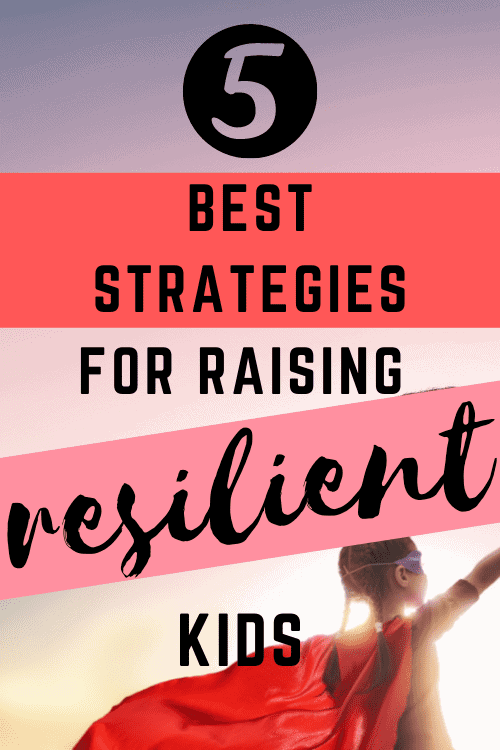
“Straight-A students don’t change the world; Resilient kids do.” I’m paraphrasing, but this is a quote by Dr. Kathy Koch, one of my favorite child experts. Raising resilient kids is not easy, but this quote rings in my ears as both true and freeing because resilience is usually a direct result of hardship.
A few years ago, we added a child from foster care to our family. We were in it to adopt and from the start, we worked at bonding with this six-year-old boy. Our boy was only with our family for two months, but they felt like an eternity. He did not bond with us and he pushed every. single. one. of my husband’s and my oldest son’s buttons. This created a tension in our home that was nearly unbearable. In the end, there were threats to our daughter’s safety and we could not commit to adopting our dear son. If I’m completely honest, I believe that these dangers were there because we wouldn’t have been able to admit that we weren’t the right parents for our son had the issues not been this major.
It is absolutely the most humbling thing a mom has to say: “I’m not the best mom for you.” I still tear up thinking about it. After four years in the adoption process, this was not the happy ending we had hoped for.
The way he left was straight out of a nightmare. We told his social workers that we would keep him and provide constant supervision until they could find him a new placement and left it at that. Hours later, they called and said, “We’ll be picking him up by the end of the day.” We were left with two hours with our son. On top of that, we were instructed not to tell him anything that was happening. I still choke up thinking about that day. I still miss that challenging little boy with every part of me. Tears still stream down my face when I look at his picture and I am riddled with guilt and regret. We will most likely never see that boy, who we thought was to be our son, again.
This experience shattered our family. We have spent so much time trying to pick up the pieces of our family and each of our children have struggled to move on without him in their own ways. We are raising resilient kids. It’s not because we wanted to, but because we stepped out in faith, did something risky, and had to pick up the pieces afterward. That was the stuff nightmares are made of, but we have emerged, albeit still wounded and scarred, on the other side.
At the same time, our foster son is incredibly resilient. We constantly pray that God will grant him that resilience and the strength to keep going after all that has happened to him in his short life. We trust that the Lord will be faithful to our foster son, as He has been to us and that the family he is now with will also be committed to raising resilient kids!
Can you teach resilience? I don’t think you can, but I believe you can do things that foster resilience because at some point, like it or not, your child will go through something difficult. Being resilient is the only way to survive in this world.
Five Steps to Raise Resilient Kids:
- Realize that God grants us resilience-builders, not resilience–
Just as God does not “grant us patience,” but rather, patience-builders, he does not grant us resilience. Resilience is learned through tough—sometimes incredibly ugly—stuff. It’s not easy! It is difficult and miserable to watch your children walk through things like grief, bullying, abuse, failure and all the other things that lead to resilience. My oldest son recently confessed to me, “Sometimes, I still wake up in the middle of the night and cry over it.” Nearly five years later, we are still walking through that dark tunnel of grief…but there are far more glimmers of light in the darkness…so we press on.
When something bad happens to your child, it is heart-breaking to not be able to fix it. I couldn’t fix my foster son’s past and I can’t fix my oldest son’s grief. I can only help him walk through it to emerge stronger.
Shortly after we lost our foster son, some friends of our family had a baby who died a few short hours after birth. My oldest son insisted on going to her funeral, even though it was only held for close family, because in his words, “I know what it’s like to lose a sibling, Mom.” He understood their grief and needed to be there for his friends. He is not only more resilient, but more sympathetic and compassionate.
- Do not fix your child’s problems–
When you solve a problem for your child, the only thing she learns is that you can do it better than she can. Ladies, do you love it when your husband tries to solve your problems, instead of just listening? I don’t know of anyone who does! Kids don’t need that either. Instead of telling your child what to do about a problem, ask him, “What do you think you should do?” “Why?” and “How?”
Allowing your child to think through the problem and the solution builds self-confidence. It also allows him or her to feel successful if the solution works, and to learn from it if the solution does not work. We take away so many learning opportunities when we do everything for our kids. And in doing so, we do not raise resilient kids!
- Encourage your child to try new things—especially those that scare him.
My younger son is very cautious. Our oldest is fearless. There is no happy medium. Years ago, we took our sons to an adventure course with every part being around 30 feet in the air. Our oldest son sailed through it. He was waiting to complete the last task, while we were still cheering on our other son to take the first step. He was 30 feet in the air, crying so hard, scared out of his mind. I was on the ground acting trying not to act the same way!
I wanted, so badly, to say, “Get him down from there!” But I want to raise resilient kids so, instead, I prayed from the ground, loud enough for him to hear me. I recited Scripture to him and encouraged him that He could do all things through Christ’s strength. Eventually, he took the first step, then the next, until he completed the course. He was so proud of himself! And he was resilient! He fought his fear and won! And he never could have experienced that, had I pulled the plug, and jumped in to rescue him.
- Don’t pick them up before they fall–
You have to allow your children to fail sometimes. The greatest lessons in life stem from failure. There are so many people who have reassured me that I didn’t fail our foster son, and on some level, maybe they are right. But you know what? In many ways, I did fail him, whether I like to admit it or not. And because of so many of those failures, I am a better mom to our adopted daughter than I was to our foster son. Even God has to let His children fail sometimes in order for them to be changed. The Lord didn’t pick me up before I fell. I made mistakes that I learned from and became a better mom and a far more compassionate, resilient person.
As the parent of a teenager, I have become more familiar with stepping back and allowing my children to fall. I can’t be there to catch them. I can only be there to pick them up, dust them off, and encourage them to try again, but to do it differently next time.
It is humbling. It means putting my pride aside because sometimes my children make mistakes that are embarrassing to my parenting. But at the end of the day, this is not about my pride. It’s about their eternity. I’m not trying to raise children who always obey their parents. I’m trying to raise adults who always obey their God.
- Don’t brush off their pain–
Your children will feel pain. Our adopted daughter often makes a sad face. When I ask her, “Why are you sad?” She almost always says, “I’m sad about my birth mom. I wish I could go live with her.” It gets tiring sometimes because I am her mom. I am the one taking care of her and loving her and I have no idea why her birth mom didn’t keep her or where she is. But my beautiful daughter will always live with that hole in her heart, and whether I like it or not, I will never be able to take the place of her birth mom. As tempting as it is, sometimes, to say, “Okay. I get it. You’re sad. Let’s move on,” that will not help her to be resilient. It will only communicate to her that her pain does not matter.
You may never deal with this kind of pain, but your child will still feel pain. Maybe it’s from dealing with mean girls. Maybe it will be pain from a loss or grief. Your child will likely go through a break-up, or ten; and will struggle when a best friend constantly wins popularity contests, and your child doesn’t.
As adults, the pain that most teens and children deal with seems minimal. They have no idea what’s coming, right? This world will deal them all sorts of REAL pain. But remember, to them, it’s REAL. It’s true pain because it’s important to them. Brushing it off doesn’t help your child become stronger. Instead, it causes more pain. We need to acknowledge their hurt and help them take the steps to forgive and move on.
Final Thoughts on Raising Resilient Kids
Parenthood has taught me, the hard way, that the qualities I want my children to have–compassion, understanding, kindness, love, peace, strength, boldness, and resilience–are qualities nobody is just born with. These characteristics need to be nurtured, strengthened, and tested. They are developed through…hard things.
Obviously, when you’re holding your brand-new baby, you would never hope your child would go through hard things. As a parent, it’s not easy to not be able to fix it. Resilience-builders stink! But in the end, they are necessary if we want to raise resilient kids who will change the world!
RElated: Making Good Memories From a Crummy Situation
